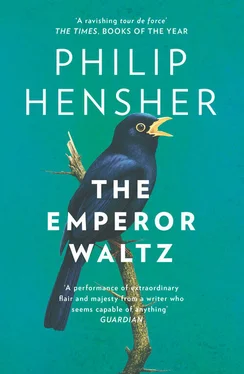Philip Hensher - The Emperor Waltz
Здесь есть возможность читать онлайн «Philip Hensher - The Emperor Waltz» — ознакомительный отрывок электронной книги совершенно бесплатно, а после прочтения отрывка купить полную версию. В некоторых случаях можно слушать аудио, скачать через торрент в формате fb2 и присутствует краткое содержание. Жанр: unrecognised, на английском языке. Описание произведения, (предисловие) а так же отзывы посетителей доступны на портале библиотеки ЛибКат.
- Название:The Emperor Waltz
- Автор:
- Жанр:
- Год:неизвестен
- ISBN:нет данных
- Рейтинг книги:3 / 5. Голосов: 1
-
Избранное:Добавить в избранное
- Отзывы:
-
Ваша оценка:
- 60
- 1
- 2
- 3
- 4
- 5
The Emperor Waltz: краткое содержание, описание и аннотация
Предлагаем к чтению аннотацию, описание, краткое содержание или предисловие (зависит от того, что написал сам автор книги «The Emperor Waltz»). Если вы не нашли необходимую информацию о книге — напишите в комментариях, мы постараемся отыскать её.
The Emperor Waltz — читать онлайн ознакомительный отрывок
Ниже представлен текст книги, разбитый по страницам. Система сохранения места последней прочитанной страницы, позволяет с удобством читать онлайн бесплатно книгу «The Emperor Waltz», без необходимости каждый раз заново искать на чём Вы остановились. Поставьте закладку, и сможете в любой момент перейти на страницу, на которой закончили чтение.
Интервал:
Закладка:
‘I should be most surprised,’ Frau Scherbatsky said. ‘Is the stew not to your taste, Herr Wolff?’
‘Oh, perfectly,’ Wolff said. ‘It may be a little dry for me, but I am an old soldier. I ask for nothing in the way of luxuries or especially delicious food, you know. And they come from? It seems a strange conception, to conceive of or invent a religion from the beginning.’
‘Well, it may be an Oriental religion, brought to Weimar, taking root here,’ Neddermeyer said. ‘I believe they are based at the new art school, under the direction of one of the masters – now, his name …’
But then it was clear to Christian that all three had agreed, in the interests of peace and civility, that the Bauhaus and its madness were not to be mentioned before or raised by Wolff, since the conversation was now abruptly turned to a bridge at Erfurt, one filled with shops, one older and longer and more beautiful than the one in Florence that people talked of so. Christian had been trying, without success, to see what the object in Wolff’s lapel was. It was a silver insignia or motif of some sort. He could not quite make it out.
14.
Around Weimar, the Masters of the Bauhaus took their leisure.
Kandinsky sat in a deep armchair, an ashtray precariously balanced on its arm, and sucked on a cigar. His dinner was finished, and a fug of smoke hung heavily over his head. His wife was opposite him, darning a pair of his socks and listening to him talk.
‘I saw Klee this afternoon,’ Kandinsky said. ‘He made such a fuss, oh, such a fuss, about the price of a cup of coffee. You would have thought it was the end of the world.’
‘How much was the sum, Vassily Vassilyevich?’ Nina said.
‘It was two thousand marks. Or three thousand. Yes, first it was two thousand and then it was three thousand. The price of the coffee went up between us ordering the first cup and us ordering the second cup. What would have happened if we had not had the extra thousand marks on us. But we did, so all was well. People fuss so about small things. No – what am I saying. I said two thousand marks, I meant two hundred thousand. You could not buy a cup of anything for a thousand marks.’
‘But a thousand marks is a thousand marks,’ Nina said sensibly. ‘Before the war, you could have bought a sofa, a table, one of my Vassily Vassilyevich’s paintings for a thousand marks. And now it is nothing times a hundredfold, the difference between a cup of coffee one moment and the next.’
‘That is so,’ Kandinsky said, ruminating over a puff of smoke. ‘Klee could not restrain himself. On the subject of money, he becomes a Swiss businessman – not a very good Swiss businessman. His one idea is not to spend any of it. He was telling me that his new idea is to paint his pictures on newspaper – he said the day was approaching when he could not afford to paint on paper or canvas. I told him that there was no need to make such savings – he should simply spend what he had on materials now, and in a year’s time he would be glad of it.’
‘And what did Klee respond?’ Nina asked.
‘Klee?’ Kandinsky said. ‘He cannot bear any outlay. Of course, he paints a painting every day, and none of them can be sold, so the blame lies with him, truly. Nina Nikolayevna, where is the bronze of the horse that used to stand there, on the table?’
‘And there I am – finished,’ Nina said, laying the socks and the needle and thread down with relief. ‘What did you say?’
Kandinsky repeated himself.
‘It must be travelling slowly from Russia with the other things,’ Nina said. ‘If it has not been robbed and destroyed. One day they will all arrive, all your things, and we will be at home here.’
‘The Constructivists have taken it,’ Kandinsky said. ‘And melted it down for one of their towers. We will never see my little horse again.’
‘Soon there will be a revolution in Germany,’ Nina said. ‘And we will all be shot. So nothing will matter very much any more.’
‘Yes, that’s so,’ Kandinsky said. He sucked meditatively on his cigar.
Two streets away, Klee lifted his violin from its case. They had eaten well. On Saturday night, Klee liked to choose the dinner, and to cook it himself. He liked the inner organs of beasts, bitter, rubbery, softly textureless, perfumed with bodily waste in a way only the practised would enjoy, and Felix had grown up finding these things ordinary and even pleasant; Lily had got used to them, and now took the Saturday dinner as part of how Paul was. Klee divided food into blond and brunette; he could cook sweetbreads in either way, dark or light. Tonight the food had been the heart of an ox, a monstrous thing. Klee had cleaned and stuffed it with meat, turnip, carrot and potato, and a herb of his own discovery, which had given the whole thing an odd flavour of liquorice. It had been a little heavy. Lily sat at the piano, ready to play, but evidently slightly uncomfortable: she burped gently from time to time. Felix sat on the sofa, the sole member of the audience. Paul took the violin from its case, unhooked the bow and, without hurry, gave the bow a good coating of rosin.
This evening it was to be the Kreutzer sonata. Klee was feeling ambitious. When he felt bold, incapable of restraint, on the verge of great and exciting things, he cooked the heart of an ox for dinner and he played the Kreutzer sonata afterwards. He often played it as something to live up to, before embarking on great enterprises. Lily often concluded that a great change was in the offing when she heard, from the studio, the sound of the first chords of the Kreutzer sonata being played once, twice, a third time; meditatively, trying it out, softly, then with dramatic force. That first chord, four notes at once on the violin, would be heard again and again, as Klee tried to get the sound exactly right; then a pause on one of the middle notes, a doodle, a trill, a thoughtful and slow attempt at the tune in the slow movement, as if Klee were taking it apart from the inside. This morning, the chord was sounded in some kind of announcement: he took the top note towards quite a different place; a dotted rhythm, a gay and yet monumental tune it took Lily a few moments to place, though she knew it as well as she knew her own face. Klee was enjoying himself by playing the little prelude to the Emperor Waltz . A few notes of it, only. And then silence: he had returned to work. For a week now, the Kreutzer sonata had been sounding from the studio at unexpected times, and Lily had taken the hint, and practised the piano part while her husband had gone out for his daily walks or to meet with Kandinsky. Was the larger endeavour a change in Klee’s art, or was it just to announce the beginning of a new term at the art school? But for days he had been practising in his own systematic way, and tonight they were going to attempt the Kreutzer. The outbreak of gaiety in those few notes of the waltz was a sign of it: he felt liberated today.
Klee raised the violin to his face. He looked, sober, at Lily, who beamed and raised her hands to the keyboard. Klee’s eyes shone intently, like those of the villain in a melodrama. He hung the bow above the strings; with a single gesture, he brought it down. The chord sang out; a cloud of rosin puffed from the bow, its dust glittering in the light from the lamp. Felix sat forward on the sofa, his loose, comfortable brown plus-fours bunching up and his green stockings falling down to his ankles. He clasped his hands in his lap. The beginning of the Kreutzer sonata was the most inexpressibly exciting thing he ever heard. It was like drawing back the curtains at seven thirty in the morning and seeing the lake on the first day of holiday, like the colour of the middle of the yolk of a fried egg in the country, that exact yellow of A major. It was almost better than those other things, because it would soon turn to fury and thunder and blackness, before it went all the way round and found its way back. It was a joy to hear Papa play it and call up a summer morning here, in this dull curtained room filled with things, smelling a little bit of the ox’s heart from dinner.
Читать дальшеИнтервал:
Закладка:
Похожие книги на «The Emperor Waltz»
Представляем Вашему вниманию похожие книги на «The Emperor Waltz» списком для выбора. Мы отобрали схожую по названию и смыслу литературу в надежде предоставить читателям больше вариантов отыскать новые, интересные, ещё непрочитанные произведения.
Обсуждение, отзывы о книге «The Emperor Waltz» и просто собственные мнения читателей. Оставьте ваши комментарии, напишите, что Вы думаете о произведении, его смысле или главных героях. Укажите что конкретно понравилось, а что нет, и почему Вы так считаете.












